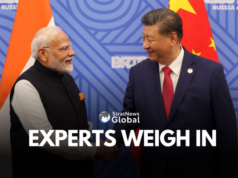Dreaded terrorist groups like Jamaat-ud-Dawa (JuD) and its affiliate Lashkar-e-Taiba (LeT), that have continuously targeted Kashmir, are “state actors” receiving instructions from and operating under directions from the Pakistani military, says Arif Jamal, the Washington-based Pakistani scholar and author.
Speaking to StratNews Global over a video-conferencing platform, Jamal, who has interviewed LeT founder Hafiz Saeed several times, described their linkages.
“Lashkar-e-Taiba is one of the departments of Jamaat-ud-Dawa but because of its action in Kashmir it has become more prominent (in India) than Jamaat-ud-Dawa. Jamaat-ud-Dawa is actually organised as a political party, which has a militant group, Lashkar-e-Taiba and the goal of the Jamaat-ud-Dawa is bring about Salafi Islam in Pakistan and beyond Pakistan,” said Jamal.
“The Jamaat-ud-Dawa and Lashkar-e-Taiba are not non-state actors. Jamaat-ud-Dawa is very closely linked with the Pakistani military and I consider at least Jamaat-ud-Dawa as a state actor. They do not usually carry out such attacks (Pahalgam kind attack) without their (Pakistani military) knowledge and permission.”
“If this attack was carried out by Lashkar-e-Taiba then it must have been permitted and allowed by the Pakistani military. But at this time we do not know much. I am sure Indian government and intelligence agencies have gathered some information, but they have not made it available to us (the public),” he said.
Jamal is the author of two seminal works, Shadow War: The Untold Story of Jihad in Kashmir and Call for International Jihad: Lashkar-e-Taiba (1985-2014).
Jamal controversially argues that these are not terrorist groups, rather they are Islamist groups and they see that as their “foremost duty and are willing to die” for the cause of Islam. Therefore, no conventional army can win any war against them.
He also claimed that the terror complexes India targeted in Muridke, Bahawalpur and Muzaffarabaf, Sarjal and other places, were not being used for training terrorists. These were being used by their families who were evacuated by the authorities after the terror strike in Pahalgam and India’s promise of retaliation.
Jamal warns that over four decades of Jihad have weakened Pakistani society, the space for democracy has shrunk and violence has become the norm, which may suit the Jihadis who want an Islamic state in Pakistan.
He said being a smaller country with limited resources, Pakistan cannot afford to support these terrorist groups while also expanding the defence budget. Since the ceasefire was announced the Pakistani government has said it will hike the defence budget by 18 per cent.
“It’s a lot of money which will be flowing from development projects into military projects and it’s going to give a lot of economic pain to people. And if this tension continues, Pakistan will have a very bad economic situation in the years to come,” Jamal warned.
On the US “intervention” during the peak of India’s Operation Sindoor and Pakistan’s Operation Bunyan al-Marsoos, he said it could have gone nuclear had President Donald Trump not stepped in. He said Pakistan will never accept a defeat at India’s hands, so the urge to go nuclear will always be there.
“From the Indian viewpoint, the war is still on. It is only a ceasefire. The war has not ended. And when we are in a state of war, it is very difficult to really see the truth. India is saying one thing, but President Trump has been saying over and over and over again that a nuclear war was imminent and his pressure stopped the war,” he said.
Jamal makes another interesting point: after having fought a Jihad in Afghanistan with the US against Russia, Pakistan may have no problems in fighting a Jihad for China against India.
The caveat here is the Pakistani army would not want a full-blown war with India. What they would prefer, is a slow simmering conflict, one that is low-cost for them and keeps India on edge.
“During this war India was seen as an American proxy not only in Pakistan but also in China. And that is why China helped Pakistan in a very unprecedented way. Nobody in Pakistan even was expecting that,” he said.
He averred, “It looks like America wants to use India against China and China understands that. Now, Pakistan has a history of fighting jihad for the Americans in the 1980s and then after the 9/11 attack. Now, Pakistan is used to fighting jihad for others, and why not fight a war for China, which benefits both China and Pakistan.”
“So I think if there is a war in the future (between India and Pakistan), China will be helping Pakistan a lot more than this time,” he underscored.




